THE ABBINGDON MUSIC RESEARCH CD-77
| THE ABBINGDON MUSIC RESEARCH CD-77 |
| OLD SCHOOL DIGITAL IN THE MODERN WORLD |
|
|
|
July 2008 |
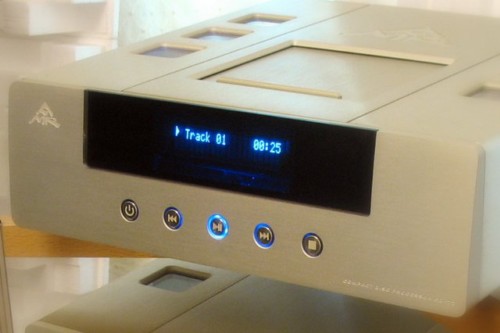
Say what?! Digital is new technology, right? It can’t be “old school” already can it? A lot can change in twenty-five years. Back in 1982, when the first CD was sold, Men At Work, Hall & Oates, and Olivia Newton-John topped the Billboard Charts. Madonna wasn’t even a “material girl” yet. Magnum P.I., Dallas, and M*A*S*H ruled the boob tube. Need more proof? A popular Sesame Street teaching tool used to ask: “Which one of these is not like the others?” You know, you’re shown three items and asked to pick the dissimilar one. Consider these three items: an LP, a cassette tape, and a compact disc. Go ahead … pick. From the mid-80s until just recently choosing which of these items was not like the other was obvious. Today, all three are more alike than different in many ways – not the least of which is their apparent obsolescence. With the increasing convenience and popularity of iTunes, digital downloads, hard drives, music servers and music-management software, “perfect sound forever” may no longer be referring to those oft-maligned 4 ½ inch polycarbonate discs.
While we may have experienced a relative “resurgence” in vinyl sales over the last few years, vinyl records are still less than one percent of total album sales. If, as it appears, CDs follow a similar path of relative extinction (witness the accelerating demise of brick and mortar stores and the diminishing selections of those that remain), why should you be interested in reading about a multi-kilobuck, red-book only CD player like the AMR CD-77? In this author’s opinion, one need only look at the enormous selection of high quality turntables available today versus the limited selection when vinyl was in its heyday. We audiophiles are slow to give up an old trusted friend, particularly when we’ve amassed a large selection of music. Now you may be thinking this is a bad analogy. After all, our reluctance to give up on analog was based on vinyl’s sonic superiority, right? Going from one digital source (CD) to another (a hard drive and music server) on the other hand may simply be going from one turd to another. Hell, it may even be an improvement! Possibly, but consider how far the CD has come in its 25 year history. As the owner of a decent turntable, I’m no stranger to the sonic benefits of analog. However, digital has been narrowing the gap over the years. Considering that progress, we probably still haven’t tapped the full potential of our discs.
Finally, there’s something about touching and feeling our source material and listening with liner notes in hand. So, if you’re like me and reluctant to dump all of your CDs just yet (or use them as coasters), you’ll still be interested in great CD sound for a relatively great price – precisely what the AMR CD-77 offers.
Not Your Children’s iPod – Tiny, Light and Portable It Ain’t
If you’re thinkin: “We don’t need no stinkin iPods” – don’t worry, the AMR CD-77 from Abbingdon Music Research (AMR) will never be confused with one. When I unpacked this beast from its impressive aluminum flight case, two things immediately struck me. First, the packaging and accessories evidence AMR’s attention to detail from stem to stern. From the custom fitting socks and densely molded foam inserts, to the not-so-standard power cord, to the inclusion of a set of quality RCA terminated interconnects, AMR has left no stone unturned. Second, the sheer size and power amp-like heft of the player let you know the CD-77 is literally no lightweight. While not quite as large as my reference amplifiers, the CD-77 is an imposing piece measuring 17 ½” x 18″ x 6″ and weighing a whopping 62 pounds (107 pounds packed)!
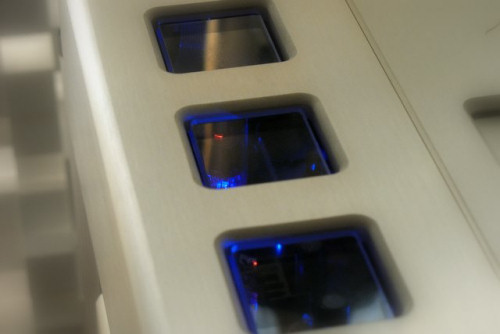
Exterior
Sheer weight and mass alone, however, do not a great player make. Yet before ever listening to it, I quickly got the impression that the size and weight of the CD-77 isn’t an appeal to the “bigger is better” male-ego but a serious and ambitious engineering design. The CD-77’s exterior is neither Spartan nor quite audio jewelry. Its nicely finished brushed aluminum chassis comes in either a titanium or champagne finish.
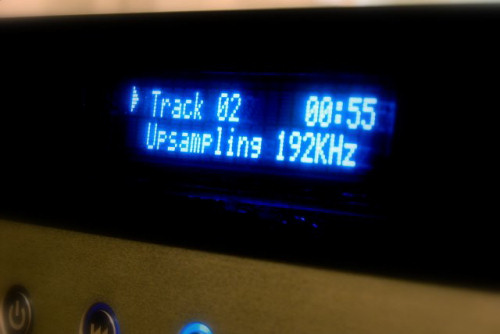
A thick front faceplate angles slightly back toward the rear of the unit and houses the illuminated display and five (5) easy to use touch-sensitive manual controls. The CD-77 is a top-loader with the drawer flanked by three Plexiglas “windows.” These windows are not there just so the owner can admire the player’s engine, but for ventilation purposes for the six tubes that reside inside. A large magnetic stabilizer puck is used to clamp down the disc. The CD-77 is bathed in a pool of blue LED light that’s clearly visible through the windows and intensifies when the top drawer is opened. In a dark room, it gives off quite a seductive glow. Some may like it, some may hate it – I liked it. The sizable, brushed aluminum remote includes a motion sensing feature that illuminates (also in blue) the numeric keypad and other select functions on a large back-lit screen – a nice feature when listening in that dimly lit room.
The rear panel of the CD-77 houses both XLR and RCA analog output connectors, a power switch, an IEC connector and a USB port (should you want to use the CD-77’s DAC for that iPod or other digital source). The CD-77 is supported by four large footers with a dense foam-like insert that AMR’s distributor claims makes the CD-77 impervious to vibration regardless of what it’s placed on. While I find that claim a stretch, I didn’t test it choosing instead to review the unit as-is.
![]()
Don’t forget to bookmark us! (CTRL-SHFT-D)
Stereo Times Masthead
Publisher/Founder
Clement Perry
Editor
Dave Thomas
Senior Editors
Frank Alles, Mike Girardi, Russell Lichter, Terry London, Moreno Mitchell, Paul Szabady, Bill Wells, Mike Wright, and Stephen Yan,
Current Contributors
David Abramson, Tim Barrall, Dave Allison, Ron Cook, Lewis Dardick, John Hoffman, Dan Secula, Don Shaulis, Greg Simmons, Eric Teh, Greg Voth, Richard Willie, Ed Van Winkle, Rob Dockery, Richard Doron, and Daveed Turek
Site Management Clement Perry
Ad Designer: Martin Perry




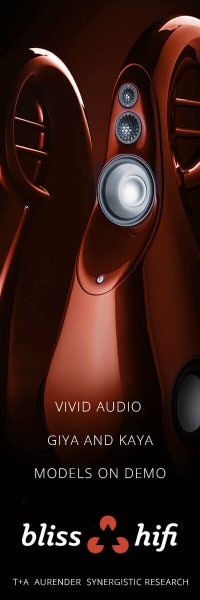

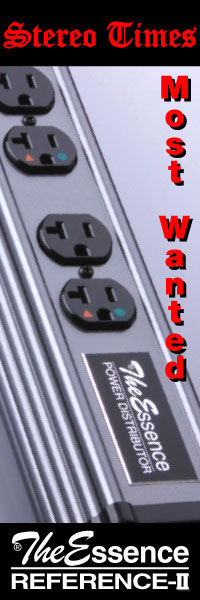
Be the first to comment on: THE ABBINGDON MUSIC RESEARCH CD-77